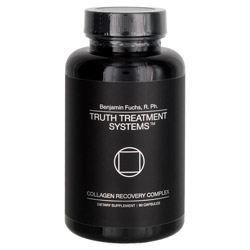2024 (8)
Ingredient: Collagen
Collagen is the most abundant protein in the body and helps give structure to our hair, skin, nails, bones, ligaments and tendons in our body. Thanks to collagen, we're better able to move, bend and stretch. Collagen is also behind helping hair shine, skin glow and nails stay strong. Collagen has many important functions, including providing your skin with structure and strengthening your bones.
When we get older, the production of collagen begins to slow down. As a result, skin can become fragile and less elastic. In addition, hair starts losing its color, joints aren't as flexible and bone may lose their density. Aging results in thinning of all three layers of the skin: the epidermis, the dermis, and the hypodermis. The top layer of the skin, the epidermis, provides a waterproof barrier and protects the body from external harm. This layer covers the dermis, which contains connective tissue, hair follicles, sweat glands, and collagen. Underneath the dermis is the hypodermis, a layer of subcutaneous tissue made up of adipose (fat) cells and connective tissue. Thinning of these layers is accompanied by a decrease in collagen. Collagen production decreases by approximately 1% with each year of age after maturity (about age 21), leading to a loss in firmness and elasticity of skin
While topically applied collagen will moisturize the skin, that's about the extent of what it can do. Applying collagen topically has never been shown to stimulate collagen synthesis or growth. This is because collagens have molecular weights making them too large to penetrate the top layer of skin. Even though adding collagen to a topical skincare product may be ineffective, that doesn't mean there aren't topical products that can improve collagen production. For example, topical vitamin C in the form of L-ascorbic acid with concentrations between 5 and 15% was proven to have a skin anti-aging effect by inducing the production of collagen. Topical application of tretinoin can improve the appearance of photoaged skin by stimulating new collagen production in the dermal layer of skin. Another option is ingestable forms of collagen that can help improve collagen production.
What's the best way to keep collagen production at its peak? Healthy diet and exercise! Start early in life to maintain your best glowing skin.

 write a review
write a review
